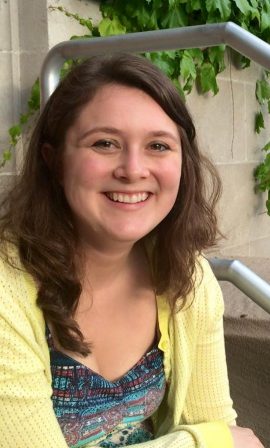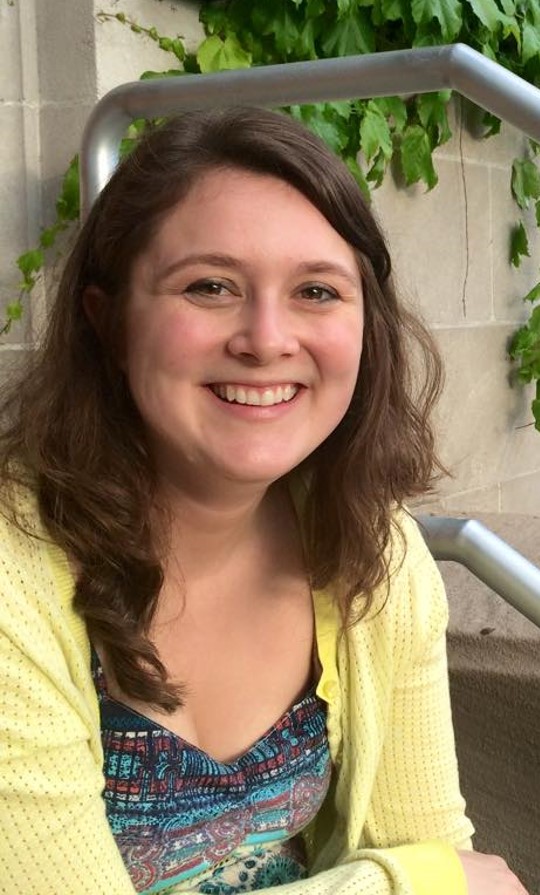 Congratulations to our newest SPARC Award Winner, Rebecca Stadler, who is studying Speech/Language Pathology at Marquette University, Milwaukee, WI. Rebecca graduates in May 2016. Read her winning essay below:
Congratulations to our newest SPARC Award Winner, Rebecca Stadler, who is studying Speech/Language Pathology at Marquette University, Milwaukee, WI. Rebecca graduates in May 2016. Read her winning essay below:
I was introduced to the field of speech-language pathology at a young age when my brother Bobby was born with cerebral palsy. From that day forward, I went along to countless doctors’ appointments, therapy sessions, and even day camps. I quickly grew into a wide-eyed five year old who asked Bobby’s neurologist about his brain scans and was shown around the clinic during his speech therapy session. My childhood observations contribute to my interest in communication sciences and disorders, and have begun to prepare me for my future as a speech-language pathologist.
I personally experienced language acquisition when I studied abroad in Granada, Spain, influencing the way I approach speech-language pathology. Along with working towards my Spanish major, I volunteered my time teaching science classes to Spanish-speaking middle school students. I facilitated the students’ first exposure to a new language by recapping the material they learned that week in English. I experienced a language barrier first hand through the students’ frustration in understanding the material, and through the challenge I faced working with their teacher who spoke solely Spanish. Ever since this unique experience of immersing myself in another culture, I have been eager to work with a diverse clinical population. My firsthand experience provided me with a unique point of view as I approach therapy with my own clients. My passion for learning the Spanish language and also learning about language development contributes to my ability to provide therapy that is the best for the patient’s wellbeing. I am eager to continue learning the most current evidence based practices to best meet the needs of my individual patients.
After my involvement with adolescents in Spain, I was eager to learn more about the research aspect of speech/language pathology. I began research as an assistant in Dr. Leann Smith’s Transitioning Together lab at the Waisman Center. I worked on the Transitioning Together project providing intervention and a support group for adolescents with autism spectrum disorders (ASD) and their families focusing on the transition after high school. In addition, I worked with CSESA (Center on Secondary Education for Students with ASD), which is a research and development project that supports optimal outcomes for students after graduation. By providing support as a leader of the teen intervention group, I put research into practice as I encouraged teenagers with ASD to set goals and plan for their future. Throughout my research experience, their robotic speech and inability to easily pick up on social cues became more apparent. I saw first hand that speech and language intervention is not only crucial early in life, but also for adolescents. As such, this area of research investigating new methods to evaluate and eventually treat adolescents with communicative disorders is one I would like to continue as a clinician. Clinically, I am drawn towards working with children and adolescents with social disorders, but have been exposed to a variety of other patient populations at Marquette University. My eyes have been opened to multiple methods for assessment and treatment and have given me insight as a clinician to always consider the patient’s functional outcomes. Everything I have learned over the last year has made the decision of where and with what patient population to work much more difficult.
In the Speech and Hearing Clinic at Marquette, I have worked with patients ranging from ages 2-65. My clients had diagnosis of aphasia, Down syndrome, autism, Dandy-Walker syndrome, cerebral palsy, and multiple disabilities. Collaborating with my supervisors, clients, and their families allowed me to take into consideration the patient’s diagnosis, abilities, and difficulties to create therapy activities that would lead the most functional outcomes for each client. My coursework and clinical experience over the last year have given me a unique perspective to take with me as I enter my second year as a graduate student. For example, I worked with 2 six year olds with autism spectrum disorders in a dyad therapy session and I used the current, evidence-based program, The Incredible Flexible You to teach and apply social skills necessary for their age. I planned lessons around the curriculum, modified the curriculum to meet each of their needs, and collaborated with my supervisor to create appropriate activities for each girl’s strengths and weaknesses. Their parents were extremely supportive and involved, so I created homework assignments and activities to use at home in order to see generalization of skills and to contribute to each girl’s well-being outside of the therapy room. With my one of my adult clients with aphasia, I discussed his goal ideas with him at the beginning of the semester in order to make sure I was working on his goals in therapy.
Over the last year, I have begun to understand that my client’s physical, social, emotional, moral and cognitive development influence learning as I was able to take this into consideration when working with all of my clients. I adjusted sessions when activities were too easy or too difficult and I modified materials that were not appropriate for individual clients. For example, with my 10 year old client with Down syndrome, I was able to recognize that further developing his expressive language would later lead to increased and more positive social interactions with peers to meet social and emotional needs. I was able to work with him to target appropriate conversations to be had and to include nonverbal communication to make sure listeners are aware he is attending to the conversation. I adjusted my sessions by providing more visual supports for him to begin understanding the importance of expressive language and social language skills. I understand that students have different learning styles, and was able to adapt my sessions in order to meet the needs of my clients. For example, my child clients’ sessions were after school causing them to be distractible. I created movement-based activities to keep them engaged. One client’s mother reported she was concerned at the beginning of the semester that the therapy time right after school would negatively affect her son’s performance. At the end of the semester, his mother reported she appreciated my effort to keep him engaged and learned that he still benefitted from therapy despite the time of day due to my abilities to adapt to his behaviors and meet his needs.
Throughout my clinical experience, I learned the value of self-reflecting in order to best maximize my client’s outcomes in therapy. Before each session, I used the previous session’s data to reflect upon my client’s progress in order to plan activities and create lesson plans. I valued short and long-term planning with my supervisors, clients, parents, and relevant professionals. With an ever growing eagerness and passion to immerse myself in the study of speech-language pathology, I am confident that both my experiences and my drive have prepared me for my clinical practicums in both the medical and school setting, as well as positioning me as a future asset to the field of speech-language pathology.
About SPARC
Ensign Therapy SPARC (Scholarship Program And Recognition Campaign) is inspired by its namesake and the sense of liveliness and excitement that therapy students and new graduates bring to our facilities and in-house therapy programs. With this scholarship program, we are deliberately seeking out those individuals who ignite a desire for excellence in themselves, their patients, their colleagues and co-workers.

